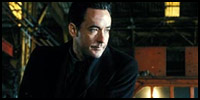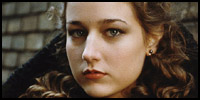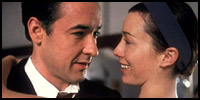
 |
Max (2002) Directed by Menno Meyjes Cast: John Cusack, Noah Taylor, Molly Parker, Leelee Sobieski, Ulrich Thomsen, David Horovitch, Janet Suzman, Andras Stohl, Peter Capaldi, Kevin McKidd, John Grillo, Anna Nygh, Judit Hernadi 2002 – 108 minutes Rated: Reviewed by Dustin Putman, December 2, 2002.  When a scruffy, penniless man (Noah Taylor) introduces himself as Adolf Hitler to Jewish arts dealer Max Rothman (John Cusack) in the opening minutes of "Max," a fictionalized account of Hitler's infamous pre-WWII years, a bitterly cold wind moves past them. Years of history classes and secondhand accounts tell us today of what a monster the anti-Semitic dictator Hitler became, and to see him prior to these pivotal years, striking up a friendly conversation with a Jew, is chilling.
When a scruffy, penniless man (Noah Taylor) introduces himself as Adolf Hitler to Jewish arts dealer Max Rothman (John Cusack) in the opening minutes of "Max," a fictionalized account of Hitler's infamous pre-WWII years, a bitterly cold wind moves past them. Years of history classes and secondhand accounts tell us today of what a monster the anti-Semitic dictator Hitler became, and to see him prior to these pivotal years, striking up a friendly conversation with a Jew, is chilling.
 The directorial debut of screenwriter Menno Meyjes (1998's "The Siege"), "Max" never recaptures this indelible feeling of threat until the frightening, irony-filled final scenes. What stands between these bookending moments is wobbly, uneven filmmaking, at best. Whole scenes and key supporting characters constantly drift in and out of focus, with little rhyme or reason for their inclusion at all. Occasional jump-cuts and awkward camera directions signal either too little principal photography coverage, a screenplay (written by Meyjes) more appropriate for the stage than the screen, or an incompetent editor. Whatever the case may be, "Max" has "first-time director" written all over it, and the arresting, contemplative subject matter demands a more experienced filmmaker to do it justice.
The directorial debut of screenwriter Menno Meyjes (1998's "The Siege"), "Max" never recaptures this indelible feeling of threat until the frightening, irony-filled final scenes. What stands between these bookending moments is wobbly, uneven filmmaking, at best. Whole scenes and key supporting characters constantly drift in and out of focus, with little rhyme or reason for their inclusion at all. Occasional jump-cuts and awkward camera directions signal either too little principal photography coverage, a screenplay (written by Meyjes) more appropriate for the stage than the screen, or an incompetent editor. Whatever the case may be, "Max" has "first-time director" written all over it, and the arresting, contemplative subject matter demands a more experienced filmmaker to do it justice.
 Set in Munich, Germany, circa 1918, Adolf Hitler meets Max Rothman--a fellow soldier of WWI who lost his right arm in battle--at his modern art gallery showing. Hitler, an aspiring artist, wants Max to display and sell his work in his art warehouse, but Max is not impressed enough to accept his plea. Nevertheless, Hitler begin a sort of quasi-friendship with Max that goes against his burgeoning anti-Semitic views. All Hitler really wishes for is to get his artwork shown and respected, and Max responds by instructing him to put as much passion into his art as he does into his political beliefs. All leads up to a finale that lays the way for the ultimately destructive path Hitler later takes in life.
Set in Munich, Germany, circa 1918, Adolf Hitler meets Max Rothman--a fellow soldier of WWI who lost his right arm in battle--at his modern art gallery showing. Hitler, an aspiring artist, wants Max to display and sell his work in his art warehouse, but Max is not impressed enough to accept his plea. Nevertheless, Hitler begin a sort of quasi-friendship with Max that goes against his burgeoning anti-Semitic views. All Hitler really wishes for is to get his artwork shown and respected, and Max responds by instructing him to put as much passion into his art as he does into his political beliefs. All leads up to a finale that lays the way for the ultimately destructive path Hitler later takes in life.
 The poorly-titled "Max" holds several thought-provoking "what-if" scenarios and some intriguing dialogue exchanges, but it does not form a gratifying whole. One suspects that, had the story continued throughout Hitler's reign in Germany over WWII, it would have made for a far better picture. Because the link between fiction and reality overlaps so much, it is difficult to get fully involved in what is happening onscreen.
The poorly-titled "Max" holds several thought-provoking "what-if" scenarios and some intriguing dialogue exchanges, but it does not form a gratifying whole. One suspects that, had the story continued throughout Hitler's reign in Germany over WWII, it would have made for a far better picture. Because the link between fiction and reality overlaps so much, it is difficult to get fully involved in what is happening onscreen.
 It also doesn't help that the central character of Max Rothman is so impassively handled under the helm of Menno Meyjes' direction. Rothman, once an artist himself whose handicap from the war has put a stop to it, is fleetingly seen spending time with his loyal wife, Nina (Molly Parker), and two children, while carrying on an affair with beautiful aristocrat Liselore (Leelee Sobieski). This love-triangle subplot goes nowhere, leads to an anticlimactic conclusion, and is frustrating in its undernourished development.
It also doesn't help that the central character of Max Rothman is so impassively handled under the helm of Menno Meyjes' direction. Rothman, once an artist himself whose handicap from the war has put a stop to it, is fleetingly seen spending time with his loyal wife, Nina (Molly Parker), and two children, while carrying on an affair with beautiful aristocrat Liselore (Leelee Sobieski). This love-triangle subplot goes nowhere, leads to an anticlimactic conclusion, and is frustrating in its undernourished development.
 Largely a two-character show, it is nice to see John Cusack (2001's "Serendipity"), as Max Rothman, sway from the kind of safe characters he usually plays, while Noah Taylor (2001's "Vanilla Sky") solidly embodies, both physically and mentally, what Hitler might have been like during this time period. The Hitler in "Max" has not yet been completely corrupted, and isn't yet a bad man, but when, in one scene, he writes down, "Art + Politics = Power," it is obvious which road he is headed down. The female roles, in comparison, are mostly ignored. Molly Parker (1997's "Bliss"), as wife Nina, and the great Leelee Sobieski (2001's "My First Mister"), as mistress Liselore, get only a few minutes each of screen time, and little of worth to say or do.
Largely a two-character show, it is nice to see John Cusack (2001's "Serendipity"), as Max Rothman, sway from the kind of safe characters he usually plays, while Noah Taylor (2001's "Vanilla Sky") solidly embodies, both physically and mentally, what Hitler might have been like during this time period. The Hitler in "Max" has not yet been completely corrupted, and isn't yet a bad man, but when, in one scene, he writes down, "Art + Politics = Power," it is obvious which road he is headed down. The female roles, in comparison, are mostly ignored. Molly Parker (1997's "Bliss"), as wife Nina, and the great Leelee Sobieski (2001's "My First Mister"), as mistress Liselore, get only a few minutes each of screen time, and little of worth to say or do.
 Save for some luscious visuals in the way of Lajos Koltai's (2002's "The Emperor's Club") cinematography, "Max" is clearly suited more for the stage, and aspires to add up to more than it does. Where the film is headed is always apparent, and how it gets there does not enlighten. Anyone who even cursorily knows the history of Adolf Hitler will not learn a single thing about him that they did not already know in the course of the film. The stunning ending that director Meyjes has cooked up, ironic yet truthful, is the best that "Max" ever gets, and it isn't worth wading through the first 100 minutes to get there.
Save for some luscious visuals in the way of Lajos Koltai's (2002's "The Emperor's Club") cinematography, "Max" is clearly suited more for the stage, and aspires to add up to more than it does. Where the film is headed is always apparent, and how it gets there does not enlighten. Anyone who even cursorily knows the history of Adolf Hitler will not learn a single thing about him that they did not already know in the course of the film. The stunning ending that director Meyjes has cooked up, ironic yet truthful, is the best that "Max" ever gets, and it isn't worth wading through the first 100 minutes to get there.
©2002 by Dustin Putman |
 |













